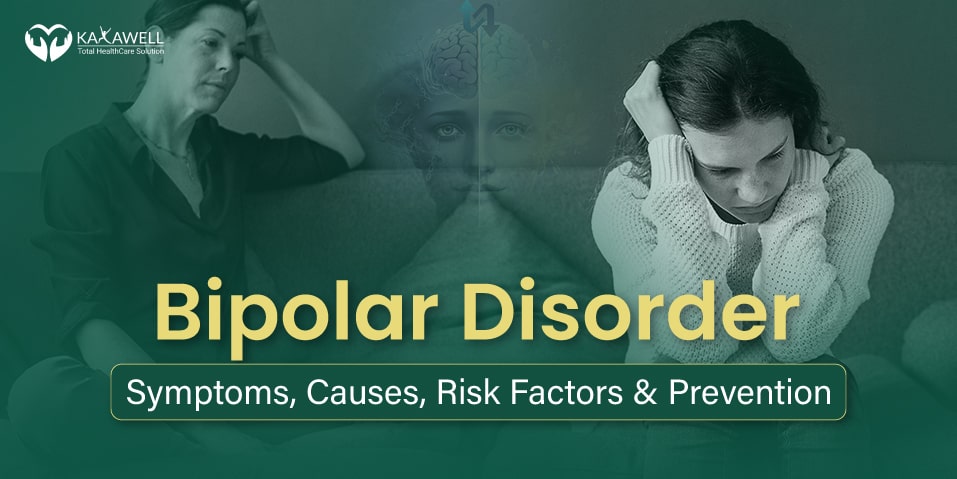Bipolar Disorder, also known as manic depression, is a mental health condition characterized by intense mood swings, including emotional highs (mania or hypomania) and lows (depression).
You may feel sad or hopeless when you become depressed, and lose interest or pleasure in most activities. You may feel euphoric, full of energy or excessively irritable when your mood changes to mania or hypomania (less extreme than mania). Sleep, strength, appetite, judgment, actions and the ability to think clearly can be influenced by these mood swings.
Mood swings can occur rarely or regularly a year. While most people between episodes will experience some emotional symptoms, some may not experience any.
Though bipolar disorder is a lifelong condition, by following a treatment plan you can manage your mood swings and other symptoms. In most cases, medication and psychological counselling (psychotherapy) are used to treat bipolar disorder.
Symptoms
In bipolar disorder, a fixed pattern does not accompany the dramatic cycles of high and low moods. Someone may feel the same state of mood several times (depressed or manic) before switching to the opposite mood. Such episodes will occur over weeks, months, and at times even years.
How severe it becomes differs from person to person and can also change, becoming more or less severe over time.
Symptoms of mania:
- Excessive happiness, hopefulness, and excitement
- Unexpectedly, he switches from cheerful to irritable, frustrated
and aggressive - Restlessness
- Rapid speech and poor concentration
- Increased energy and less need for sleep
- Unusually high sex drive
- Making grand and unrealistic plans
- Showing poor judgment
- Drug and alcohol abuse
- Becoming more impulsive
An individual with bipolar disorder may have it during depressive periods:
- Sadness
- Loss of energy
- Feelings of hopelessness or worthlessness
- Not enjoying things they once liked
- Trouble concentrating
- Uncontrollable crying
- Trouble making decisions
- Irritability
- Needing more sleep
- Insomnia
- Appetite changes that make them lose or gain weight
- Thoughts of death or suicide
- Attempting suicide
When to see a doctor
Despite extreme moods, people with bipolar disorder often don’t realize how much their emotional instability disrupts their lives and their loved ones’ lives, and don’t get the treatment they need.
And if you’re like some people with bipolar disorder, you might appreciate the feelings of more positive euphoria and cycles. But this euphoria is always followed by an emotional crash which can leave you depressed, worn out — and possibly in financial, legal or relationship trouble.
Check with your doctor or mental health professional if you have any symptoms of depression or mania. Bipolar disorder is not getting any better on its own. Seeking care by a mental health professional that has bipolar disorder experience will help you keep your symptoms under control.
Causes
Bipolar disorder does not appear to be caused by a single cause but is more likely to result from a range of interacting factors.
Genetic factors
Some studies have suggested a genetic component for bipolar disorder may exist. It is more likely to emerge in a person who has a family member with the condition.
Biological traits
Bipolar disorder patients often show physical changes in their brains, but the correlation not clear.
Brain-chemical imbalances: The imbalances in neurotransmitters appear to play a key role in many mood disorders, including bipolar disorder.
Hormonal problems: Hormonal imbalances could trigger bipolar disorder, or cause it.
Environmental factors: Abuse, mental stress, a “significant loss” or some other traumatic event may contribute to bipolar disorder or trigger it.
One possibility is that some people with a genetic predisposition for bipolar disorder may not have noticeable symptoms until an environmental factor triggers a severe mood shift.
Risk factors
Factors that may increase the risk of bipolar disorder developing or act as a trigger for the first episode include:
- Has a first degree relative to bipolar disorder, such as a parent
or sibling - High-stress periods, such as the death of a loved one or another
traumatic event - Drug or alcohol abuse
Complications
Untreated bipolar disorder can cause serious issues affecting every area of your life, such as:
- Suicide or suicide attempts
- Legal or financial problems
- Damaged relationships
- Problems related to drug and alcohol use
- Poor work or school performance
Some other health conditions can worsen bipolar disorder symptoms or make treatment less successful. These include:
- Eating disorders
- Attention-deficit/hyperactivity disorder (ADHD)
- Anxiety disorders
- Physical health issues, such as heart disease, thyroid problems,
headaches or obesity - Alcohol or drug problems
Prevention
There’s no sure way to prevent bipolar disorder. However, getting treatment at the earliest sign of a mental health disorder can help prevent further worsening of bipolar disorder or other mental health conditions.
If you have been diagnosed with bipolar disorder, some strategies can help prevent minor symptoms from turning into full-blown mania or depression episodes:
- Pay attention to warning signs. Addressing symptoms early on will
avoid aggravating episodes. You may have established a trend for and what
causes your bipolar episodes. If you feel like you are falling into the episode
of depression or mania call your doctor. Involve family or friends to see for
warning signs. - Avoid drugs and alcohol. Using alcohol or recreational drugs can
worsen your symptoms and make them more likely to come back. - Take your medications exactly as directed. You may be tempted to
avoid being handled — but don’t. Stopping your medication or reducing your dose
on your own can cause withdrawal effects, or may worsen or return your
symptoms.

Leave a Reply
You must be logged in to post a comment.